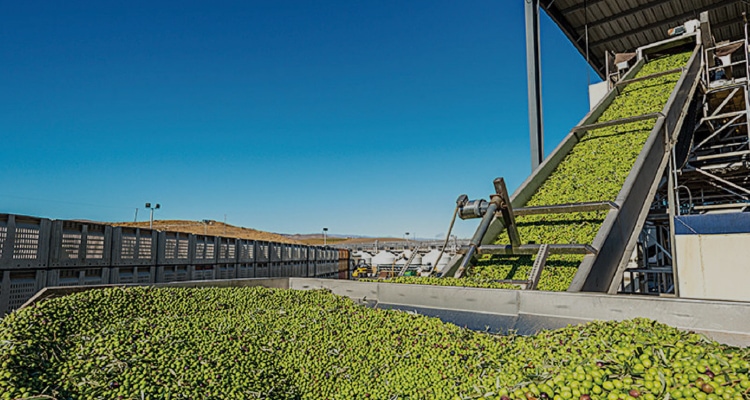Musco & AFS Logistics: Oiling the Wheels of Change

About five years ago, when Michael Lin joined Musco Family Olive Co. as senior director of supply chain, he “walked into a tight-running operation,” he says. At the same time, Lin sought to bring greater discipline and automation to many of the company’s logistics and supply chain processes. To work toward these goals, Lin enlisted the help of AFS Logistics, a third-party logistics provider.
THE CUSTOMER:
Musco Family Olive Co. is the country’s largest producer of black ripe olives. After more than eight decades in business, the third-generation, family-owned California company now works with more than 450 farmers and runs the first food-processing plant in the world to achieve a Level 2 Safe Quality Food ethical sourcing certification.
THE PROVIDER:
Founded in 1982, AFS Logistics, based in Shreveport, Louisiana, provides differentiated logistics services to more than 1,800 customers and employs more than 380 employees across seven locations.
Musco, which boasts eight decades of history, is the largest producer of black ripe olives in the United States. The company works with more than 450 California farmers, providing olives that are transported to four warehouses in the United States and then distributed to retailers across the country.
Musco’s olive-processing plant in California is a near-zero-waste facility and the first food-processing plant in the world to achieve a Level 2 Safe Quality Food ethical sourcing certification.
Despite its robust operations, Musco is still a relatively small, third-generation, family-run company. It doesn’t have extra resources it can easily allocate to areas outside its functional expertise—namely, olives.
Working within those constraints, Lin set several supply chain and logistics objectives: reduce manual processes, enhance the freight audit process, and boost the company’s ability to identify location and arrival times of in-transit freight so it could more proactively address customer questions and continue to provide quality service. Achieving these goals would also help Musco scale its operations and offset increasing logistics costs.
Lin kickstarted a partnership with AFS Logistics, with whom he’d worked at a previous company. Based in Shreveport, Louisiana, AFS provides logistics services, including freight audit and payment, as well as parcel, less-than-truckload, and transportation management services to more than 1,800 clients.
Revamping the Carrier Dynamic
The two companies first collaborated on a domestic managed transportation program, says Andy Dyer, president, transportation management for AFS.
At the time, Musco was working with a number of incumbent carriers. While Lin didn’t want to drop them, he wanted to make sure they were meeting Musco’s business needs, had solid safety records, and were reliable and cost-effective.
Through carrier reviews, Musco and AFS were able to confirm that the incumbent carriers would continue to provide optimal service.
In addition, AFS provided Musco with access to a range of additional carriers from across the country. As a result, Musco doubled its carrier mix.
ENSURING STRONG RELATIONSHIPS
The AFS team also guided Musco on the benefits of building relationships with carriers. Strong relationships help ensure Musco can maintain its partners not just in good times, but also when the business encounters challenges. “We stay loyal to our carriers as long as they’re within reason, while also introducing other carriers. Having that access has been huge,” Lin says.
As they accumulate data on carriers’ service levels, the partners also engage in network analysis. For instance, Musco and AFS work together to assess if it makes sense to adjust forward stocking locations, given changes in demand or customer demographics.
Musco previously lacked a coordinated process for tendering shipments. This occasionally led to double- or triple-brokering loads. And, some brokers would re-broker freight to asset-based carriers, prompting concerns about maintaining integrity in the chain of custody.
AFS now coordinates Musco’s annual freight bids. AFS only considers asset-based providers for the carrier network, reducing the likelihood of shipments being brokered multiple times. To ensure Musco can leverage cost-effective shipment options, AFS receives outbound freight shipment notices via electronic transmission. AFS can then access competitive rates from a national pool of vetted carriers.
Once a shipment is booked, the transaction automatically loads into Musco’s ERP system, streamlining the billing process and enabling shipment tracking. This reduces the amount of time previously spent on tasks like manually coordinating and managing shipments.
The managed transportation service from AFS also helps Musco adjust to market changes by providing information that helps to optimize the transportation mode for each shipment.
Branching out With Track and Trace, visibility
Before working with AFS, Musco’s lack of an effective track-and-trace system limited its visibility to shipments. Now, by using the AFS transportation management system (TMS), Musco has access to visibility on shipment location, as well as costs and carrier operating performance. This data enables Musco to address issues as they arise, so it can continue to maintain quality service.
This data also aids in reducing customer chargebacks, which Dyer says is a key capability for Musco. Retailers, and particularly grocers, can impose significant penalties when a supplier makes a mistake. Working with AFS, Musco is able to receive data from carriers on arrival and wait times that it previously could not access. With this data, Musco can challenge claims that, for instance, deliveries arrived after the scheduled delivery time.
In addition, because Musco hadn’t been rigorously auditing its less-than-truckload, truckload, or intermodal freight, management couldn’t ensure billing accuracy. And with limited visibility into freight costs and load status data, it was difficult to dispute claims on issues like on-time in-full, as well as customer deduction claims. As a result, Musco was at risk of overpaying accessorial charges.
Getting Serious About Audits

Musco Family Olive Co.’s processing plant in California is a near-zero-waste facility and the world’s first food-processing plant to achieve a Level 2 Safe Quality Food ethical sourcing certification.
To help Musco exert more control over fees and surcharges, AFS implemented an invoice audit process across all transportation modes. By providing a comprehensive review of every bill, Musco can recover many overcharges and minimize the risk of overpaying. Without this information and process, fighting fines and fees often becomes time consuming and cumbersome, Lin says.
The invoice audit process also consolidates Musco’s weekly bills into one invoice, providing timely insight into transportation costs.
Musco also worked with AFS to streamline its order fulfillment process. Now, Musco sends order details to AFS via an SQL (structured query language) download, which then feeds into the AFS TMS. AFS also provides a gateway to exchange files and messages with other external trading partners, such as carriers.
Now, when orders drop, Musco no longer needs to manually disseminate information across the company and enter it into the system, Lin says.
Over time, the relationship between Musco and AFS has expanded to include imported containers as well. On these international shipments, AFS acts as Musco’s advocate in the market.
Musco’s network of warehouses also underwent analysis as part of the new partnership with AFS. By reviewing the network’s costs and services, Musco determined it could consolidate some facilities, reducing overall inventory levels. The two companies continue to periodically tweak the network.
“Quarterly business reviews are a great opportunity to flesh out other opportunities from a service or from a cost standpoint,” Lin says. This also enables Musco to redeploy employees who’d previously been dedicated toward freight, he adds.
Enjoying Process-Driven Results
By implementing more efficient processes and technology, Musco lowered its total transportation spending by more than 10% in the first year of its partnership with AFS. It also identified additional opportunities for cost reduction, leading to another $50,000 in savings, also during the first year. Subsequent reviews have led to warehouse network optimization opportunities that Musco is currently pursuing, Lin adds.
Leveraging technology for gains
Musco also was able to double its carrier mix. And through the partnership, Musco has leveraged technology that helps it adopt a process-driven approach.
Becoming more aggressive about pursuing different shipping options is the next big frontier for Musco, Lin says. This could mean reducing the number of containers or even taking trucks off the road by shifting from a less-than-truckload to a multi-stop approach.
“We’re peeling back the onion and asking, ‘What exactly are we doing? And is there a different way versus just being efficient with what we’re doing?’” Lin explains.
Whatever strategies Musco decides to pursue, Lin says AFS is key to achieving their goals. “The AFS operations team is in constant communication with us when things are good, and they’re in front of it when there are hiccups,” he says. “We get talented people who know what they’re doing and can drive value in our decision making.”
Case Study: Growing the Grove
The Challenge
Introducing greater rigor and automation to Musco’s logistics and supply chain processes, with a goal of maintaining quality service and offsetting rising transportation costs.
The Solution
Musco partnered with AFS Logistics, leveraging the 3PL’s managed transportation service and implementing both its freight bill audit and payment and order fulfillment solutions. AFS also introduced greater structure to carrier relationships and regularly assesses the company’s logistics network.
The Results
Among other benefits, Musco lowered its transportation expense by more than 10% in the first year of the partnership, while identifying opportunities to gain an additional $50,000 in cost reduction, also during the first year of the partnership. It doubled its carrier mix and restructured roles and responsibilities to improve the value contributed by employees.
Next Steps
Evaluate different means of shipping to further cut costs and boost efficiencies.
